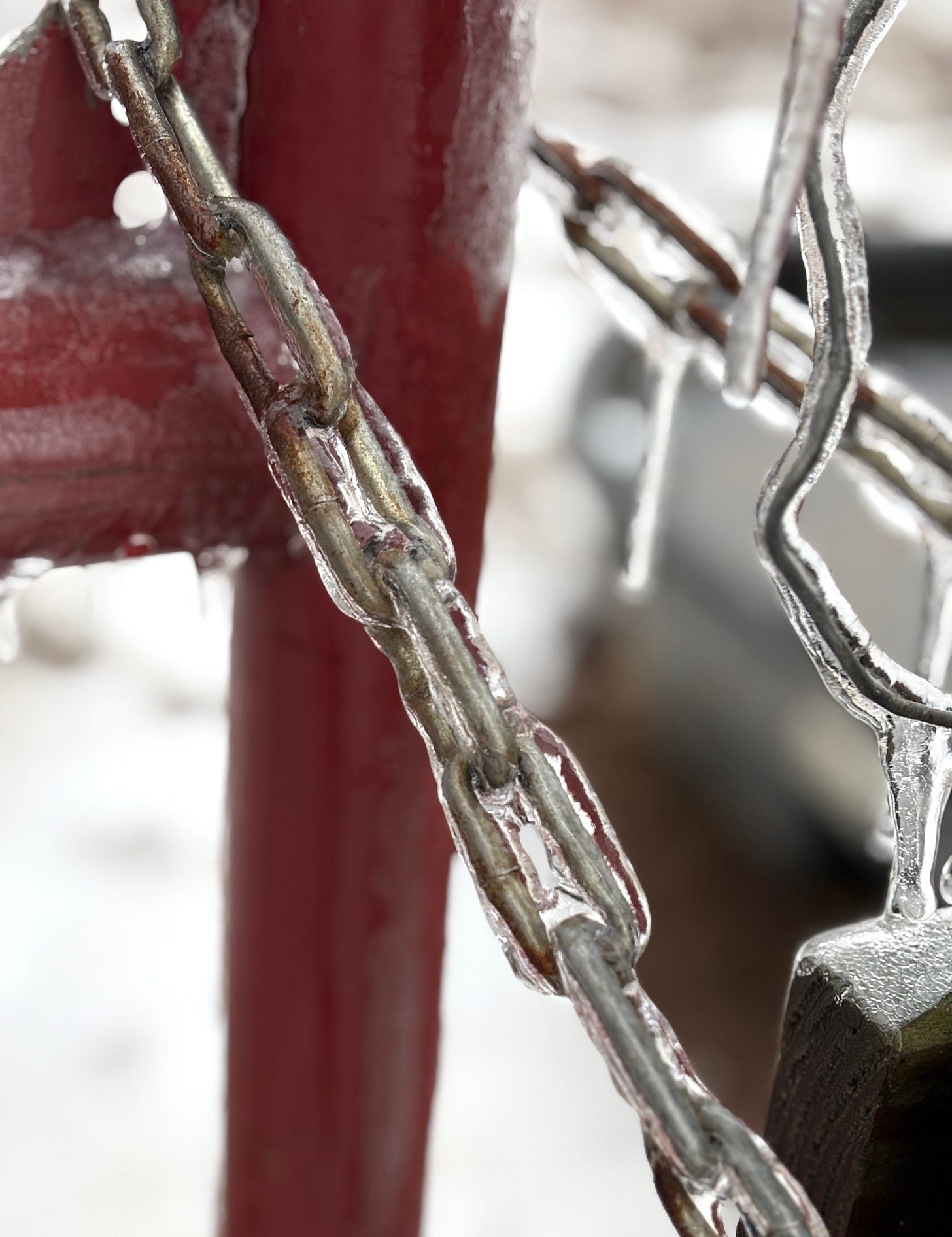Compassion vs pity
Apologies for missing my self-imposed deadline of Tuesday at 5 am. We live in the middle of nowhere, which is lovely most of the time but has its drawbacks, namely that the power goes out when we have ¼” of ice followed by three flakes of snow. It’s more than our little rural electric coop can handle. We are hopeful it won’t be as bad as the first year we were here, when two consecutive ice storms kept us in the dark for eleven straight days.
My husband says I am just now, finally, becoming the person God created me to be. For so many years—decades—I shoved her with all her thoughts and feelings and opinions and ways of being down into the basement of myself. Locked away down there, she couldn’t disrupt my effort to fit into the narrow wife/woman mold given to me and endorsed by seemingly everyone around me. There she stayed, in the dark, unseen and unheard, all but forgotten. Even I mostly forgot she was there while I grew accustomed to squeezing myself into the little box I was told would make me a “godly woman.” The mold was man made, not God made. Many parts of it looked honorable from the outside, but trying to live a stranger’s life was awkward at best, damaging at its worst.
Then trauma blew the cellar doors right off their frames, and there’s no keeping her in now. The prisoner has been released. No stopping her from spilling out, this person I hardly know and do not recognize. It’s scary at times. I don’t know how to relate to her, but my therapist always says, “with great compassion.”
Right now I am in the messy middle, not completely comfortable with either version of me, the molded one or the freed one. I wonder how the molded one managed to fake it for so long and how the freed one managed to stay silent. Now I am trying to discern what God made me to be. Who exactly am I? Which parts of each one are real and which are fake? It’s hard to know when you have no practice telling them apart.
I should have been doing this in my childhood, my teens, my twenties. It’s much harder at 63. It can be frustrating and I don’t always get it right. Sometimes the free me goes too far and doesn’t show self-restraint when she should. Sometimes she wants the freedom she should have had for forty years all at once, and that just doesn’t work. Sometimes the molded me falls back into old patterns because they’re easier, more comfortable, and then she’s disgusted at her own weakness.
It would be easy to pity both parts. But that’s a one-way, dead-end road. This is why in therapy we are continually reminded to tend to our wounded parts with compassion. And since I’m learning this lesson in real life, I am trying to paying attention to what the Lord says about it.
The other day I was reading in Matthew 15. Jesus had been busy dealing with the Pharisees (v 1–20) and commending a Canaanite woman’s faith (v 21–28). Then,
29 And Jesus departed from thence, and came nigh unto the sea of Galilee; and went up into a mountain, and sat down there.
30 And great multitudes came unto him, having with them those that were lame, blind, dumb, maimed, and many others, and cast them down at Jesus’ feet; and he healed them:
31 Insomuch that the multitude wondered, when they saw the dumb to speak, the maimed to be whole, the lame to walk, and the blind to see: and they glorified the God of Israel.
He was up in a mountain, yet “great multitudes” came to him (we’ll find out later there were well over 4,000), and they brought “those that were lame, blind, dumb, maimed, and many others...” Imagine how hard it must have been to get all those needy people up a mountain! Some couldn’t walk, some couldn’t see, some handicapped in other ways.
But the multitude got them up there and “cast them down at Jesus’ feet.” You can almost hear them saying, out of breath, “Here they are; now do something.” Surely there was an expectation of reward for all that hard work, and Jesus did not let them down: “he healed them” and even though the multitude was surprised at what happened, expectations or no, God was glorified (which was always Jesus’ goal).
32 Then Jesus called his disciples unto him, and said, I have compassion on the multitude, because they continue with me now three days, and have nothing to eat: and I will not send them away fasting, lest they faint in the way.
Now he has a lesson to teach, but the lesson is not for the crowd; it’s for the disciples, the ones who really want to follow him. This whole thing isn’t about healing needy people. He wants to show them what compassion looks like.
First, he knows where the multitude has been, what they’ve been doing, even how long it’s been since they’ve eaten. If you ever start to feel like God doesn’t know what’s going on in your life, remember this story. He knows every detail.
Second, he will not send them away empty, “lest they faint in the way.” He knows they can’t even get home without some food. He knows their bodily need and his compassion won’t let him not meet that need. His coming actions are fueled by his compassion.
33 And his disciples say unto him, Whence should we have so much bread in the wilderness, as to fill so great a multitude?
34 And Jesus saith unto them, How many loaves have ye? And they said, Seven, and a few little fishes.
Not much. But Jesus doesn’t even blink.
35 And he commanded the multitude to sit down on the ground.
36 And he took the seven loaves and the fishes, and gave thanks, and brake them, and gave to his disciples, and the disciples to the multitude.
Did you notice he gave to the disciples first? The lesson was for them. He wanted them to see the miracle of bread and fish expanding in their own hands. He wanted them to experience what his kind of compassion could do.
37 And they did all eat, and were filled: and they took up of the broken meat that was left seven baskets full.
38 And they that did eat were four thousand men, beside women and children.
You’ve probably read this story before, maybe a lot of times. Have you marveled that Jesus could take seven loaves of bread and a few fish and feed well over 4,000 people? That’s usually what we focus on.
But look a little closer. Notice how Jesus begins this lesson to his disciples:
“I have compassion.”
He didn’t say, “I can feed gobs of people.” This wasn’t about providing groceries for a big crowd. People do that all the time in stadiums and at state fairs.
This was about compassion and the results of it. He wanted them to see compassion in action.
Did you notice in verse 33 when the disciples were trying to figure out how to feed all these people, they asked Jesus, “Whence should we have so much bread in the wilderness, as to fill so great a multitude?”
How are we going to FILL them?
Years ago when Ben and I were working with the youth group at our (then) church, we were planning an activity and were trying to figure out how much pizza to order. If you know anything about youth ministry, you know the budget is tiiiiiiiight. And also, teenagers eat a LOT.
While we were negotiating the number of pizzas to order, our pastor reminded us, “Remember, we’re not trying to fill them; we’re just trying to sustain life.”
Jesus is the opposite. He’s not just trying to keep us alive; he desires to fill us with his compassion. We see this played out in verse 37:
And they did all eat, and were filled: and they took up of the broken meat that was left seven baskets full.
They were filled. That’s what compassion does.
So when my therapist tells me to meet my wounded parts with great compassion, she doesn’t just want me to feel sorry for them. She wants me to know where they’ve been and acknowledge what they’ve been through. See what they need and determine where I want them to wind up. Then provide what they need with the end goal that God is glorified.
Sometimes that looks like nourishing food and rest. Sometimes it looks like a 5-mile walk through the woods. Sometimes it’s reading through the Psalms and noticing everything that God is.
It’s not self-condemnation or shame. Jesus did not shake his head at the multitude that followed him but forgot to bring food. That wouldn’t have helped them. He gave them what they needed.
Pity feels sorry for you and then walks away.
Compassion fills you with all the help you can stand and then leaves you with leftovers.







Really enjoyed your insights on compassion. You are a deep thinker. Something I don’t stop to do often enough. Diana